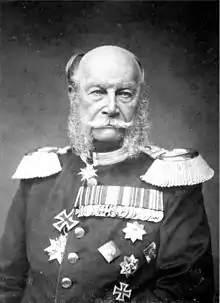Bundespräsidium
Präsidium des Bundes or Bundespräsidium (German: [ˈbʊndəs.pʁɛˌziːdi̯ʊm], Federal Presidency) was a title under the German Confederation (1815–1848, 1851–1866) whereby the Austrian delegate held the chair of the Federal Assembly. Austria was thus called the presidential power (German: Präsidialmacht). This did not give Austria extra power: its delegate simply led the proceedings of the Federal Assembly.[1]

Later, during the North German Confederation (1867-71), the same title was used for an office functioning as head of state.[2] According to the constitution, the holder of this presidency was always the king of Prussia. The king was also Bundesfeldherr, federal commander-in-chief. The constitutional changes of 1870-71 renamed the North German Confederation as the German Empire; the title and function of Bundespräsidium remained, but were now combined with the additional title Deutscher Kaiser.
Notes
- Ernst Rudolf Huber: Deutsche Verfassungsgeschichte seit 1789. Band I: Reform und Restauration 1789 bis 1830. 2nd edition, Verlag W. Kohlhammer, Stuttgart et.al. 1967, p. 589.
- Ernst Rudolf Huber: Deutsche Verfassungsgeschichte seit 1789. Band III: Bismarck und das Reich. 3rd edition, W. Kohlhammer, Stuttgart 1988, p. 657.
